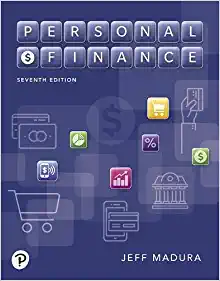Answered step by step
Verified Expert Solution
Question
1 Approved Answer
Bill and Bob are both 35 years old today. Each wants to begin saving for his retirement. Both plan on contributing a fixed amount each
- Bill and Bob are both 35 years old today. Each wants to begin saving for his retirement. Both plan on contributing a fixed amount each year into brokerage accounts that have annual returns of 10%. Both plan on retiring at age 60, 25 years from today, and both want to have $2 million saved by age 60. The only difference is that Bill wants to begin saving today, whereas Bob wants to begin saving one year from today. In other words, Bill plans to make 26 total contributions (t = 0, 1, 2, ... 25), while Bob plans to make 25 total contributions (t = 1, 2, ... 25). How much more than Bill will Bob need to save each year in order to accumulate the same amount as Bill does by age 60?
- Today you opened up a local bank account. Your plan is to make five $4,000 contributions to this account. The first $4,000 contribution will occur today and then every six months you will contribute another $4,000 to the account. (So your final $4,000 contribution will be made two years from today). The bank account pays a 6% APR that is compounded monthly. After two years, you plan to leave the money in the account earning interest, but you will not make any further contributions to the account. How much will you have in the account 6 years from today?
- Recently, Jamie and Jake each bought new cars. Both received a loan from a local bank with a rate of 10% where payments are made at the end of each month, and they both pay the same monthly payment. Jamie's loan is for $25,000; however, his loan matures at the end of 4 years (48 months), while Jake's loan matures in 5 years (60 months). After 48 months Jamie's loan will be paid off, but what will be the remaining balance on Jake's loan?
- After graduation, you plan to work for 15 years and then visit Australia. You expect to save $2,000 a year for the first 5 years and $3,000 annually for the next 10 years. These savings cash flows will start in one year. In addition, your family has just given you a $6,000 graduation gift. If your gift and all future contributions are put into an account that pays 12% compounded annually, what will your financial "stake" be when you leave for Australia 15 years from now?
- Bob is 20 years old today and is starting to save money, so that he can get his MBA. He is interested in a 1-year MBA program. Tuition and expenses are currently $40,000 per year, and they are expected to increase by 6% per year. Bob plans to begin his MBA when he is 26 years old, and since all tuition and expenses are due at the beginning of the school year, Bob will make his one single payment six years from today. Right now, Bob has $25,000 in a brokerage account, and he plans to contribute a fixed amount to the account at the end of each of the next six years (t = 1, 2, 3, 4, 5, and 6). The account is expected to earn an annual return of 10% each year. Bob plans to withdraw $15,000 from the account two years from today (t = 2) to purchase a used car, but he plans to make no other withdrawals from the account until he starts the MBA program. How much does Bob need to put in the account at the end of each of the next six years to have enough money to pay for his MBA?
Step by Step Solution
There are 3 Steps involved in it
Step: 1

Get Instant Access to Expert-Tailored Solutions
See step-by-step solutions with expert insights and AI powered tools for academic success
Step: 2

Step: 3

Ace Your Homework with AI
Get the answers you need in no time with our AI-driven, step-by-step assistance
Get Started


